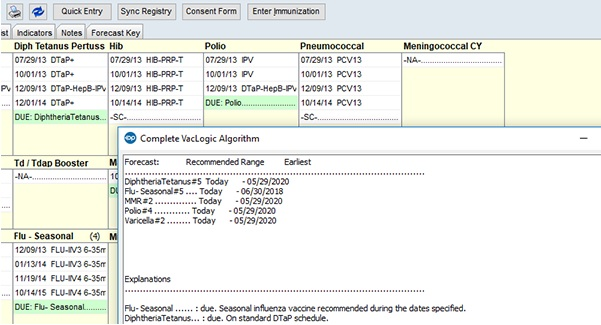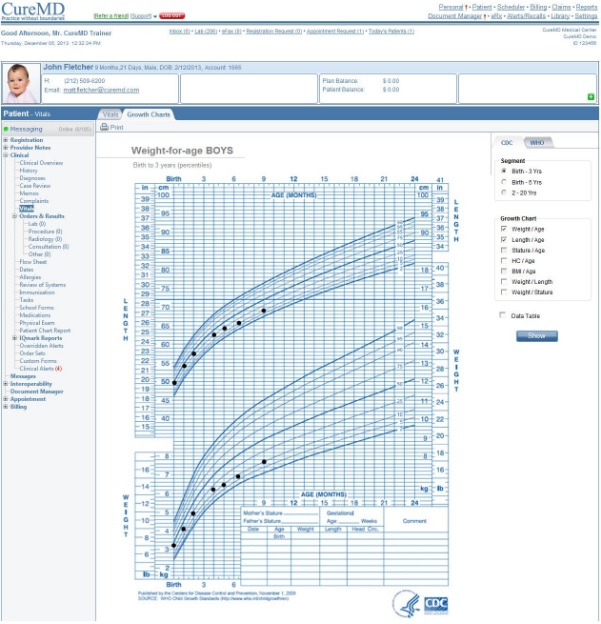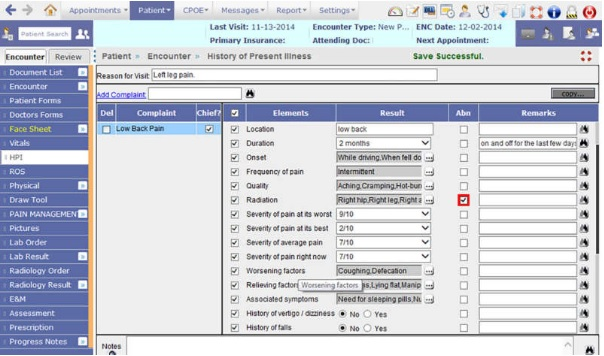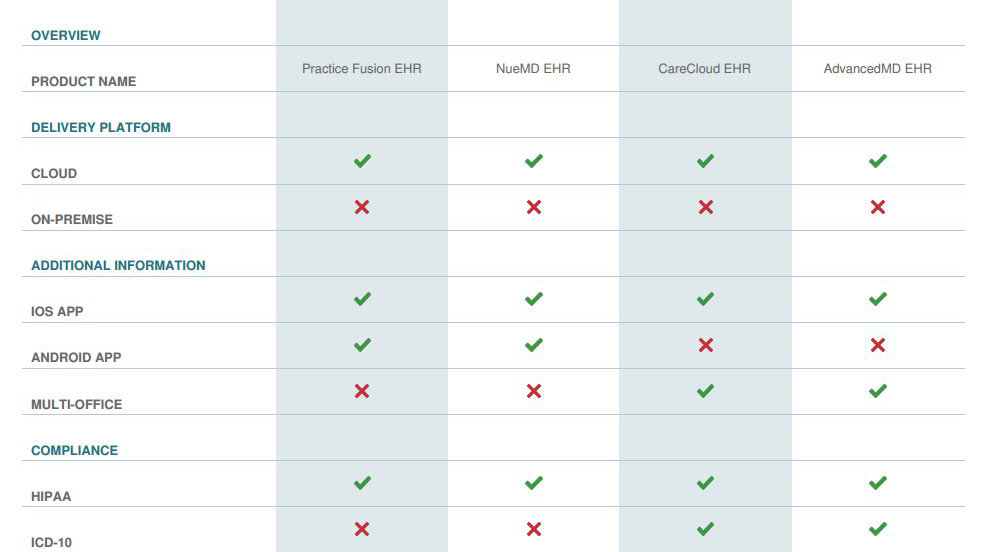Pediatrics EHR Buyers' Guide
Pediatrics EHR products improve quality of care, and if used correctly can help pediatric practices operate more efficiently from an organizational perspective.
Yet to fully leverage the benefits of a pediatrics EHR, you’ll need to find software that meets your practice’s unique requirements and be able to implement it effectively, all for a price that won’t cripple your practice financially.
This guide is designed to help you do this. Below, we cover:
- How to select the best pediatric EHR
- What requirements do pediatrics practices have for EHR software?
- Which features should you look for in a pediatrics EHR?
- How much does pediatrics EHR cost?
- Which pediatrics EHR vendors should you consider?
How to select the best pediatric EHR
The best pediatric EHR products will allow practices access to the features that enhance the quality of care being delivered. The features pediatrics practices should consider involves consideration of the unique circumstances each practice faces, but also involves universal considerations shared by all pediatric providers.
Selecting the best pediatric EHR for your practice involves an information gathering process that sets out to answer the question about what features and functionality your practice requires to meet its strategic goals and to best serve its patients. In the pediatric setting determining which pediatric EHR works best for your practice involves three considerations: clinical requirements, administrative requirements, and workflow requirements.
With the three broad requirement areas mentioned above in mind, selection teams in pediatric practices should consider the following requirements areas to guide their selection process.
Clinical requirements
When selecting a pediatric EHR product, one of the primary considerations involves selecting a product that is a good fit from a clinical standpoint. In this regard an EHR should offer features that enable these organizations to offer the best care possible.
One set of features that pediatric practices should consider involves features that allow users to receive patient-specific reminders for such clinical events such as the need for vaccines. Further, an EHR should also be able to offer clinicians further insight into these reminders and milestones by supplying information as to when a certain vaccine should be administered or any potential risks.
In addition to vaccine-related information pediatric practices should select an EHR that allows clinicians a hassle-free way to document and track routine health care maintenance and also allow for growth and development tracking. It is also important that an EHR should include standardized child developmental screenings, tests, and questionnaires with the ability to auto-populate data from these screenings into visit notes.
Administrative requirements
In addition to clinical considerations, pediatric practices should focus on how an EHR can enhance its administrative operations. Pediatric practices, like other ambulatory practices, face a difficult competitive environment in their local healthcare markets. Further, these practices commonly run on a smaller scale. As such, it is vitally important for these practices to be able to manage their administrative side of their practice in a way that allows them to operate in the most efficient manner possible. An EHR can help in this goal by allowing administrators to manage revenue and expenses more effectively, bill more effectively and monitor the financial health of their practice. This is usually carried out through the use of an integrated practice management system that works in conjunction with a pediatric EHR.
Workflow requirements
A pediatric EHR should make common administrative and clinical tasks easier and not more cumbersome and time-consuming. As such a pediatric EHR should provide a format for which clinicians and administrative staff can collect, analyze and input information in a way that does not act as a distraction or slow down how work is conducted. An effective way to ensure workflows are not disrupted relies on selecting an EHR that has an intuitive interface that allows data to read and inputted with little effort.
What requirements do pediatrics practices have for EHR software?
Pediatric practices have several requirements that mark them out from other specialties, including:
- Flexibility: children’s medical needs change significantly as they grow. A pediatrics EHR needs to offer functionality to deal with this
- Age-appropriate educational content and alerts: patient education needs to be targeted at both parents and children
- Compliance and child safeguarding: access to all data on children - healthcare included - is governed by strict regulations.
To meet these, the Agency for Healthcare Research and Quality (AHRQ) has outlined a “Model Pediatric EHR Format” as an expression of the core requirements a pediatric EHR system should meet. Central to these requirements are:
- Weight-based dosing for medications
- Anthropometric analysis
- Immunization forecasting
At a minimum, a pediatrics EHR will contain these features given the certification requirements. However, the mere presence of these features is not sufficient, rather one should expect that these features should be usable and compliment other EHR functionality.
Which features should you look for in a pediatrics EHR?
Given the recommendations offered by AHRQ which features beyond the core features discussed above should be present in a pediatrics EHR.
In 2015, AHRQ further took up the question of pediatrics EHRs for a comprehensive look a what features pediatrics practices should expect in their EHR systems. Based on their survey, the researchers found that the ideal software for pediatric clinic should contain the following features:
- Vaccine reminders and forecasting: this provides a means of documenting vaccine administration, forecasting the need for a vaccine, and reminding clinicians when vaccines are due. You can also collect and analyze data regarding populations at risk for poor outcomes without vaccination.
- Routine healthcare maintenance and growth and development tracking: informants in the AHRQ study stated that to ensure effective pediatric care that an EHR should include standardized child developmental screenings, tests, and questionnaires with the ability to auto-populate data from these screenings into visit notes.
- Family dynamics: an EHR should help identify and populate shared family history, social environment, and even billing structures and allow a sharing related data between family members and linking between individual records.
- Privacy: pediatric providers are faced with the challenge of adhering to the various privacy regulations regarding pediatric patients' personal health information. As such, an EHR should be able to segregate personal health information based on privacy requirements and permission levels.
- Managing pediatric conditions in vulnerable populations: an EHR should be able to identify at-risk patient populations based on the presence of a long-term health condition or on social and environmental factors such as homelessness which may require specific attention from a provider.
- Medication management: this feature-set includes computerized physician order entry and weight-based dosing.
- Documentation and billing: documentation and billing modules, like those serving adult patients, should be streamlined to allow easy access to pediatric-relevant information and reduce documentation workload.
- Pediatric-specific norms and growth charts: a pediatric EHR should support recording of measurements vital signs, growth metrics and other age-based normal ranges and allow for these measurements to be compared against normative values for specific ethnic, or geographic populations.
Get our EHR features directory for more information on general EHR functionality
How much does pediatrics EHR cost?
The cost of pediatrics EHRs represents an important consideration for pediatrics practices - when surveyed, 63.5% of pediatricians identified cost as a barrier to implementing a suitable EHR.
The cost of these products depends largely on the method of deployment and the range of features offered. A good starting point is $60 to $250 per provider per month if using a SaaS deployment method, or from $2,500 to $500,000 for an on-premise solution.
For more data on EHR cost, check out our completely up-to-date EHR pricing guide
These are out-of-box prices only, and will vary with add-ons or discounts, and for a true picture of how much pediatrics EHRs cost, you’ll need to factor in several ‘hidden’ costs into your budget. These include:
- Vendor implementation fees
- Training
- Support and maintenance fees
- Upgrades
- Hardware and IT (if implementing an on-premise system)
Which pediatrics EHR vendors should you consider?
Based on pediatric EMR reviews, the following products offer a comprehensive range of features required for pediatric practices.
This is not an exclusive list - make sure you use the pediatrics EHR comparison tool above to find a system that suits your practice's needs.
MediLinks
Medilinks offers a pediatric therapy EMR for practices focusing on pediatric PT, OT, and Speech
The web-based pediatric therapy software MediLinks is a comprehensive solution offers the following features:
- Scheduling: track and manage therapists’ schedules across multiple locations,
- Documentation: a full suite of pediatric documentation templates
- Clinical Assessment of Articulation and Phonology, Second Edition (CAAP-2®)
- Clinical Evaluation of Language Fundamentals® – Fifth Edition (CELF®-5)
- Preschool Language Scales, Fifth Edition (PLS™-5)
- Test of Nonverbal Intelligence, Fourth Edition (TONI-4)
- Charge capture: capture and validating charges while you document.
- Reporting: monitor key performance indicators, including attendance, monthly stats, and billing data.
Office Practicum
Office Practicum EMR offers a comprehensive suite of EHR and pediatric practice management software tools. Based on an overview of online reviews, the most valuable features include:
- 200 free EMR templates: Includes pediatric EHR templates, decision support tools, electronic school, and camp forms along with pediatric developmental assessments, surveys, and disease-specific action plans.
- Vaccination reminders: this follows ACIP guidelines and provides inventory management for VFC and private stock, issuing alerts and a rationale for recommended vaccines.
- Electronic submission to vaccine registries: submit to any supported state’s immunization registry by populating a new patient’s immunization chart with lot numbers and doses as they are administered, automatically updating your private and VFC vaccine inventory, while creating an inventory report.
- Bright Futures guidelines: provides theory-based and evidence-driven guidance for all preventive care screenings and well visits
- Pediatric growth charts: specialized chart options include Down Syndrome and preemie specific growth curves based on CDC and WHO norms.
- Integrated surveillance and screening tools: Assess patients’ overall health, development, mental health and more including CRAFFT Screening, Autism M-CHAT-R (Scored), PHQ-2 & 9, Asthma Control Test (ACT), and Bright Futures Developmental Questionnaires.

VacLogicTM vaccination reminders in Office Practicum
CureMD
CureMD offers an all-in-one certified EHR suite and integrated practice management system. Features include:
- Family link: allows users to create and maintain a complete family profile. through one-click access to linked charts and family group scheduling.
- Automated growth charts: options for both CDC and WHO Chart templates are available out of the box.
- E-prescribing: allows clinicians to send new Prescriptions and receive refill requests but also helps acquire medication history and prescription drug eligibilities.
- Outcomes analysis: allows clinicians to aggregate clinical outcomes and report on compliance with national benchmarks and P4P standards.
- Health maintenance: automatic generation of preventive care notifications, alerts and compliance reports
- Clinical overview: a longitudinal summary of patient history, trends, and alerts on a single screen.
- Workflow editor: configurable specialty workflow and process editor assemble component templates, data forms and knowledgebase to facilitate adaptation to your unique preferences, styles, and priorities. including pediatric sick visit template, pediatric 'well child' visit template, and pediatric sick visit encounter form.
- Custom screening questionnaires: allows clinicians to conduct Early Screening for Autism, ADHD, and other behavioral health issues.

Plotting child's height on a growth chart in CureMD
PrognoCIS EHR
PrognoCIS’s certified EHR offers a fully integrated EHR and practice management solution deployed in the cloud or on-premise. Features include:
- E-prescribing with analytics: prescribe medication remotely with powerful insights from Progno CIS's powerful prescription analytics tool that uses millions of de-identified prescriptions.
- Vitals and laboratory result ranges by age and gender: growth chart data in multiple formats: children with Down syndrome, as well as CDC and WHO. Early and periodic screening, diagnostic and treatment (EPSDT).
- Parents’ documentation requirements: financial responsibility data; quick ability to print standard forms, such as school physicals.
- Multiple methods of data entry, such as point and click, voice and handwriting recognition.

Recording a patient encounter in PrognoCIS
















